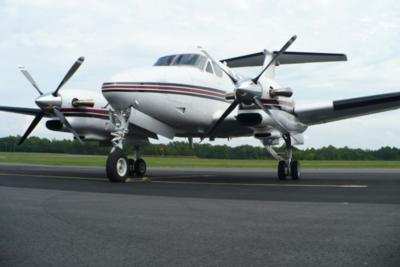Mon, Feb 12, 2018
Possible Engine Failure Can Result From Improper Fuel Management
The FAA has issued a Safety Alert For Operators (SAFO) following a boost pump failure aboard a Beechcraft King Air 90- series airplane.

The FAA noted in Safety Recommendation (SR) 16.127 that a boost pump failure in King Air 90-series airplanes leading to automatic crossfeed operation could result in dual engine failure if not managed properly by the pilot.
With a boost pump failure and the crossfeed switch closed, the High Pressure (HP) Fuel Pump on the side with the failed boost pump is able to suction-feed fuel from its Nacelle Fuel Tank and both engines continue to operate. During normal operation, the crossfeed switch is in the auto position and will automatically open in the event of boost pump failure.
If the boost pump fails, the emergency procedure in Section 3 of the Aircraft Flight Manual directs the pilot to momentarily close the crossfeed valve to determine which pump failed and then open it again, turning off the failed boost pump. The Emergency Checklist further states “If continued flight with the crossfeed closed is required”, CLOSE the crossfeed and monitor for power fluctuations. With a boost pump failure and crossfeed OPEN, fuel consumption is double the normal amount from the side with the operating boost pump. If improper fuel planning allows fuel to be depleted on that side, both engines will most likely flameout while usable fuel remains in the tanks on the side of the inoperative boost pump.
If that happens, options become limited. If the crossfeed valve is subsequently closed manually, the HP Fuel Pump on the side of the inoperative boost pump may still suction-feed, but if crossfeed remains OPEN, the HP fuel pump may instead only suction air through the empty crossfeed line. There is no engineering data to determine either way. As such, there is clear risk that a simple boost pump failure, if not managed properly, could result in dual engine failure.
Recommended Action
During training and operation, King Air 90-series owners, operators, and training departments/centers should emphasize the following:
- In the event of boost pump failure, if the pilot chooses to continue flight with the crossfeed valve OPEN, adequate fuel quantity should be verified on the side with the operating boost pump considering fuel burn on that side will be double with the crossfeed OPEN.
- In the event of boost pump failure, if crossfeed remains OPEN and fuel is depleted on the side with the operating boost pump, a DUAL engine Flameout will most likely occur.
- In the event of boost pump failure, the crossfeed valve must be CLOSED for the HP Fuel Pump to scavenge-feed fuel from the side of the inoperative boost pump.
- In the event of boost pump failure, proper fuel monitoring and management is crucial to avoid fuel starvation leading to engine failure and/or fuel imbalance beyond limitations.
(Image from file)
More News
He Attempted To Restart The Engine Three Times. On The Third Restart Attempt, He Noticed That Flames Were Coming Out From The Right Wing Near The Fuel Cap Analysis: The pilot repor>[...]
Make Sure You NEVER Miss A New Story From Aero-News Network Do you ever feel like you never see posts from a certain person or page on Facebook or Instagram? Here’s how you c>[...]
From 2009 (YouTube Edition): Leading Air Show Performers Give Their Best Advice for Newcomers On December 6th through December 9th, the Paris Las Vegas Hotel hosted over 1,500 air >[...]
Aero Linx: NASA ASRS ASRS captures confidential reports, analyzes the resulting aviation safety data, and disseminates vital information to the aviation community. The ASRS is an i>[...]
“For our inaugural Pylon Racing Seminar in Roswell, we were thrilled to certify 60 pilots across our six closed-course pylon race classes. Not only did this year’s PRS >[...]
 NTSB Final Report: Rutan Long-EZ
NTSB Final Report: Rutan Long-EZ ANN FAQ: Turn On Post Notifications
ANN FAQ: Turn On Post Notifications Classic Aero-TV: ICAS Perspectives - Advice for New Air Show Performers
Classic Aero-TV: ICAS Perspectives - Advice for New Air Show Performers ANN's Daily Aero-Linx (06.28.25)
ANN's Daily Aero-Linx (06.28.25) Aero-News: Quote of the Day (06.28.25)
Aero-News: Quote of the Day (06.28.25)



